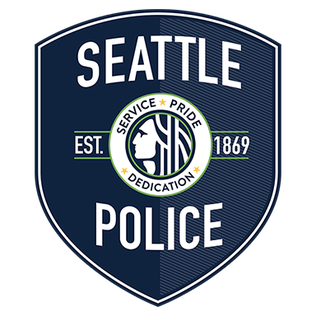
Closed-circuit television (CCTV), also known as video surveillance, is the use of video cameras to transmit a signal to a specific place, on a limited set of monitors. It differs from broadcast television in that the signal is not openly transmitted, though it may employ point-to-point, point-to-multipoint (P2MP), or mesh wired or wireless links. Even though almost all video cameras fit this definition, the term is most often applied to those used for surveillance in areas that require additional security or ongoing monitoring.

Surveillance is the monitoring of behavior, many activities, or information for the purpose of information gathering, influencing, managing or directing. This can include observation from a distance by means of electronic equipment, such as closed-circuit television (CCTV), or interception of electronically transmitted information like Internet traffic. It can also include simple technical methods, such as human intelligence gathering and postal interception.
The Electronic Privacy Information Center (EPIC) is an independent nonprofit research center established in 1994 to protect privacy, freedom of expression, and democratic values in the information age. Based in Washington, D.C., their mission is to "secure the fundamental right to privacy in the digital age for all people through advocacy, research, and litigation." EPIC believes that privacy is a fundamental right, the internet belongs to people who use it, and there's a responsible way to use technology.

Mass surveillance is the intricate surveillance of an entire or a substantial fraction of a population in order to monitor that group of citizens. The surveillance is often carried out by local and federal governments or governmental organizations, but it may also be carried out by corporations. Depending on each nation's laws and judicial systems, the legality of and the permission required to engage in mass surveillance varies. It is the single most indicative distinguishing trait of totalitarian regimes. It is often distinguished from targeted surveillance.

Sousveillance is the recording of an activity by a member of the public, rather than a person or organisation in authority, typically by way of small wearable or portable personal technologies. The term, coined by Steve Mann, stems from the contrasting French words sur, meaning "above", and sous, meaning "below", i.e. "surveillance" denotes the "eye-in-the-sky" watching from above, whereas "sousveillance" denotes bringing the means of observation down to human level, either physically or hierarchically.

A facial recognition system is a technology potentially capable of matching a human face from a digital image or a video frame against a database of faces. Such a system is typically employed to authenticate users through ID verification services, and works by pinpointing and measuring facial features from a given image.

The Seattle Police Department (SPD) is the principal law enforcement agency of the city of Seattle, Washington, United States, except for the campus of the University of Washington, which is under the responsibility of its own police department.
Gary T. Marx is professor emeritus at the Massachusetts Institute of Technology (MIT) and retired from the University of Colorado in 1996. He has worked in the areas of race and ethnicity, collective behavior and social movements, law and society and surveillance studies.
The Privacy and Civil Liberties Oversight Board (PCLOB) is an independent agency within the executive branch of the United States government, established by Congress in 2004 to advise the President and other senior executive branch officials to ensure that concerns with respect to privacy and civil liberties in the United States are appropriately considered in the development and implementation of all laws, regulations, and executive branch policies related to terrorism.

Timothy L. Burgess is an American journalist and politician from Seattle, Washington. He was a member of the Seattle City Council from 2007 to 2017, and served as Mayor of Seattle for 71 days in late 2017. Prior to his political career, Burgess was a radio journalist and Seattle Police Department (SPD) officer.
Big Brother Watch is a non-party British civil liberties and privacy campaigning organisation. It was launched in 2009 by founding director Alex Deane to campaign against state surveillance and threats to civil liberties. It was founded by Matthew Elliott. Since January 2018, Silkie Carlo is the Director.

The Domain Awareness System is the largest digital surveillance system in the world as part of the Lower Manhattan Security Initiative in partnership between the New York Police Department and Microsoft to monitor New York City. It allows the NYPD to track surveillance targets and gain detailed information about them, and is overseen by the counterterrorism bureau.

Ring LLC is a manufacturer of home security and smart home devices owned by Amazon. It manufactures a titular line of smart doorbells, home security cameras, and alarm systems. It also operates Neighbors, a social network that allows users to discuss local safety and security issues, and share footage captured with Ring products. Via Neighbors, Ring may also provide footage and data to law enforcement agencies to assist in investigations.

The use of electronic surveillance by the United Kingdom grew from the development of signal intelligence and pioneering code breaking during World War II. In the post-war period, the Government Communications Headquarters (GCHQ) was formed and participated in programmes such as the Five Eyes collaboration of English-speaking nations. This focused on intercepting electronic communications, with substantial increases in surveillance capabilities over time. A series of media reports in 2013 revealed bulk collection and surveillance capabilities, including collection and sharing collaborations between GCHQ and the United States' National Security Agency. These were commonly described by the media and civil liberties groups as mass surveillance. Similar capabilities exist in other countries, including western European countries.

Mass surveillance is the pervasive surveillance of an entire or a substantial fraction of a population. Mass surveillance in India includes Surveillance, Telephone tapping, Open-source intelligence, Lawful interception, and surveillance under Indian Telegraph Act, 1885.

A body camera, bodycam, body-worn video (BWV), body-worn camera, or wearable camera is a wearable audio, video, or photographic recording system.
Unmanned aerial vehicles (UAVs) have been used for domestic police work in various countries around the world since the mid-2000s. Their appeal comes from their small size, lack of crew, and lower cost compared to police helicopters. UAVs may be used for search and rescue operations, aerial patrols, and other roles that are usually served by crewed police aircraft. UAVs can be powerful surveillance tools by carrying camera systems capable of license plate scanning and thermal imaging, as well as radio equipment and other sensors. While a vast majority of law enforcement UAVs are unarmed, documents obtained by digital rights group Electronic Frontier Foundation indicated the U.S. Customs and Border Protection would consider arming their UAVs with "non-lethal weapons designed to immobilize" targets.

Smart cities seek to implement information and communication technologies (ICT) to improve the efficiency and sustainability of urban spaces while reducing costs and resource consumption. In the context of surveillance, smart cities monitor citizens through strategically placed sensors around the urban landscape, which collect data regarding many different factors of urban living. From these sensors, data is transmitted, aggregated, and analyzed by governments and other local authorities to extrapolate information about the challenges the city faces in sectors such as crime prevention, traffic management, energy use and waste reduction. This serves to facilitate better urban planning and allows governments to tailor their services to the local population.

The New York City Police Department (NYPD) actively monitors public activity in New York City, New York, United States. Historically, surveillance has been used by the NYPD for a range of purposes, including against crime, counter-terrorism, and also for nefarious or controversial subjects such as monitoring political demonstrations, activities, and protests, and even entire ethnic and religious groups.
Sean Whitcomb is an internet safety advocate and creator of the first anti-swatting registry. He retired from American law enforcement in 2020 to pursue a career in the video game industry.










